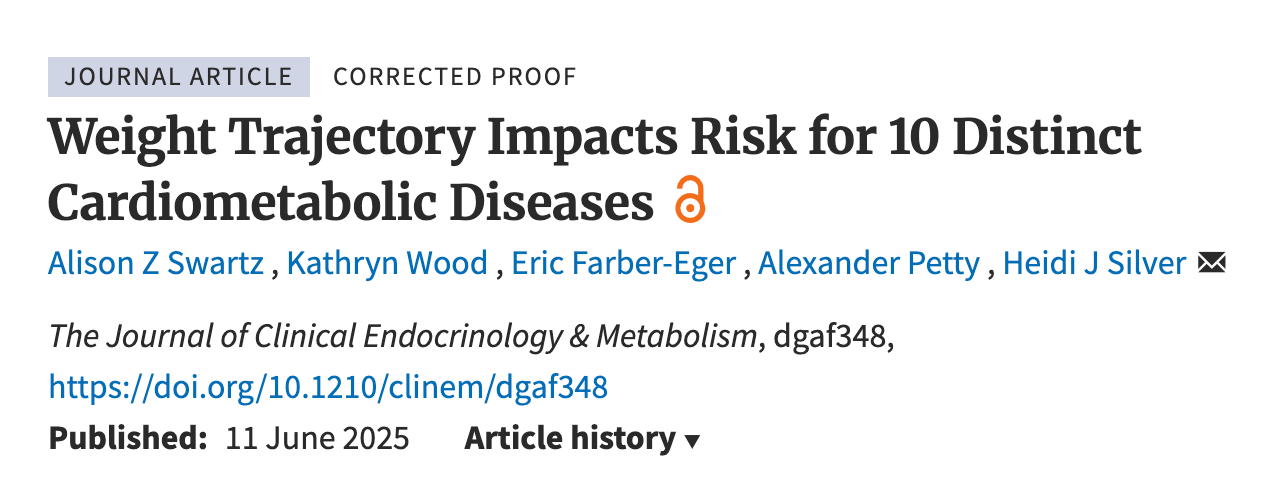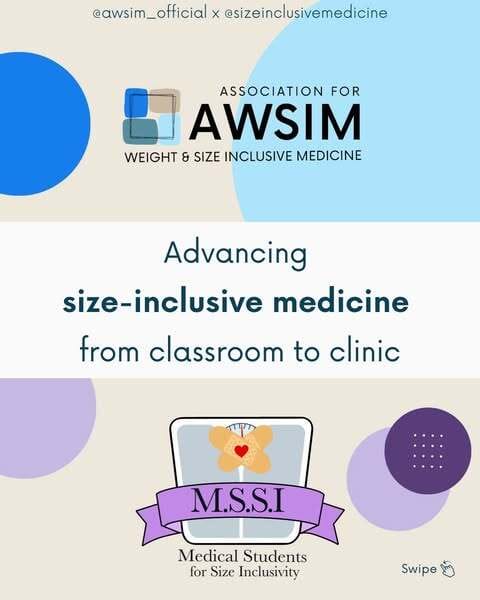- Medical Students for Size Inclusivity's Newsletter
- Posts
- September 2025 Newsletter
September 2025 Newsletter

In this issue:
Introducing our Physician Partners: The Association for Weight and Size Inclusive Medicine (AWSIM)
Meet our MSSI Chapters & Affiliates
New Study Finds Weight Cycling is Associated with Several Chronic Diseases
Upcoming Events
Our Physician Partners: The Association for Weight and Size Inclusive Medicine (AWSIM)
We are excited to announce a new collaboration between the Association for Weight & Size Inclusive Medicine (AWSIM) and Medical Students for Size Inclusivity (MSSI).
Together, we are partnering to align medical students and physicians in the fight against weight discrimination and to promote weight-inclusive, equitable care for patients of all sizes. This collaboration ensures our advocacy and leadership extend across every stage of medical training and practice.
All members of MSSI are now also members of AWSIM! This is a new international professional physician-led organization and non-profit working to advance weight-inclusive care.
“We are an international medical organization working to advance weight-inclusive care. We challenge the pathologization of body size, which continues to drive healthcare disparities and disproportionately harm larger bodied patients. By providing mentorship, education, and advocacy, our organization serves as the professional home for physicians practicing and learning about weight-inclusive care. We envision a world where patients of all sizes have access to empathetic and evidence-based health care.“
Benefits of the AWSIM membership for students include:
Free attendance to AWSIM Events
Access to weight-inclusive medicine research articles and resources online
Subscription to monthly newsletter
Opportunity to participate on AWSIM’s members only forum
Adding AWSIM Membership under “Professional Organizations” on CV
Opportunities for mentorship and project collaborations

Meet the MSSI Chapters & Affiliates
Thank you to those who joined us on August 26 for our chapters and affiliates meet & greet! We had so much fun getting to know everyone and are so inspired by the hard work of our chapter leaders across the USA and Canada.

Current chapters & affiliates:
MSSI at Hackensack Meridian School of Medicine
MSSI at University of Minnesota - Twin Cities Medical School
Health Professional Students for Size Inclusivity, an Affiliate of MSSI (University of California San Francisco School of Medicine)
Size Inclusivity in Medicine at University of Wisconsin - School of Medicine and Public Health, an Affiliate of MSSI
MSSI at Washington State University Elson S. Floyd College of Medicine
MSSI at Tufts University School of Medicine
MSSI at University of Nevada Reno SOM
MSSI at Cooper Medical School of Rowan University
MSSI at Frank H. Netter MD School of Medicine at Quinnipiac University
Medical and Dental Students for Size Inclusivity at Harvard Medical School, An Affiliate of MSSI
Columbia Students for Size Inclusivity, An Affiliate of MSSI (Columbia University)
MSSI at University of Washington School of Medicine
MSSI at UC Davis School of Medicine
MSSI at Albany Medical College
MSSI at University of British Columbia
Students for Body Acceptance and Food Freedom (SBAFF) at Oregon Health & Science University, An Affiliate of MSSI
Interested in bringing MSSI to your school? Click below for those wanting to 1) form a chapter of Medical Students for Size Inclusivity (MSSI) at your school, or 2) affiliate an existing organization at your school with MSSI. Once received, a member of MSSI will reach out with additional details, and our Chapter & Affiliate Application form!
Evidence-Based Archives
MSSI is excited to present another instalment of “Evidence-Based Archives,” our column highlighting and summarizing seminal research in the field of size-inclusive healthcare. In this section, we hope to celebrate our scholars, empower each other with knowledge, and stock up on citations for the next time we’re called upon to justify size-inclusive healthcare in the classroom, clinic or wards!
Note: This month’s evidence-based archives has also been published in AWSIM’s student highlights.
Content warning: Medicalized fatphobia
This month’s highlight:

Alison Z Swartz, Kathryn Wood, Eric Farber-Eger, Alexander Petty, Heidi J Silver, Weight Trajectory Impacts Risk for 10 Distinct Cardiometabolic Diseases, The Journal of Clinical Endocrinology & Metabolism, 2025;, dgaf348, https://doi.org/10.1210/clinem/dgaf348
This recently published large cohort study examined how different weight trajectories (including weight stability, weight gain, weight loss, or weight cycling) relate to the development of several common cardiometabolic diseases among adults with similar baseline BMI. Using de-identified electronic health records from Vanderbilt University Medical Center spanning 1997–2020, researchers applied multivariate Cox proportional hazards regression to track associations for over 83,000 patients.
Key findings included the following:
Compared to weight stability, weight cycling was linked to significantly higher risk of several conditions, including:
Heart failure [hazard ratio (HR) 1.54; 95% confidence interval (CI) 1.31, 1.82]
Obstructive sleep apnea (HR 1.28; 95% CI 1.15, 1.42)
MASLD (HR 1.28; 95% CI 1.08, 1.51)
Type 2 diabetes (HR 1.23; 95% CI 1.10, 1.38)
Both weight gain and weight loss also raised the risk of heart failure, compared to weight stability.
Importantly, baseline BMI was the same in all groups, meaning the impact of weight cycling on the risk for developing these cardiometabolic diseases was not merely driven by ‘high’ body mass.
This study draws strength from its large, real-world dataset (>83,000 participants!) spanning more than two decades and its rigorous analytic methods, which allowed for meaningful comparisons across weight trajectory groups with similar baseline BMI. However, the reliance on electronic health records means the intentionality behind weight changes, such as dieting versus illness, cannot be distinguished (though, patients with cancers were intentionally excluded for this reason). There are also the theoretical intrinsic limitations of using electronic health records such as data entry errors.
Overall, this paper underscores the harms of repeated weight loss attempts and weight cycling, which are often encouraged in clinical settings. This is especially relevant now with the rise in popularity of GLP-1 receptor agonist drugs. We know very well that for people living in larger bodies, weight cycling is not simply a matter of “non-adherence,” but a predictable consequence of biologically driven weight regain after intentional weight loss. Rather than continuing to promote weight loss at all costs, this study can be cited to:
advocate for weight-neutral, stability-focused care that supports cardiometabolic health without prescribing unsustainable dieting,
highlight how weight cycling, not high body size alone, contributes to increased disease risk, and
encourage clinicians to focus on sustainable health behaviours (balanced nutrition, physical activity, sleep, stress management, equitable access to care) instead of repeated, harmful weight loss attempts.
Have thoughts?
We are open to feedback and interested in the lived experiences of our MSSI members. Have you referenced this article in your clinical work, used it to guide patient counseling, or used it to communicate with your colleagues? How did it go?
Feel free to share your stories, reflections, expertise, and advice using the link below. With your permission, we may publish reflections in future installments of this column.
If you have a favourite article you’d like us to highlight in our next installment, feel free to submit it for consideration, also by using the link below! We look forward to hearing from you.
Upcoming Events

AWSIM Fall Symposium 2025
Friday, October 24th, 12-5pm ET
All eyes on the upcoming AWSIM Fall Symposium! Hear from a variety of speakers on relevant topics within weight inclusive care. Join AWSIM for an afternoon of connection, learning, and collective care, centered on what it means to show up for our patients and for each other in this work.
Main Sessions:
Weight Inclusive Medicine presented by AWSIM Board (1 hr)
Topics in Clinical Practice (1 hr)
Weight Inclusive Care and Medical Education (1 hr)
Advocacy and Lived Experience Panel (1 hr)
Breakout sessions & Networking (1 hr)
FREE for students and AWSIM members!

An Interdisciplinary Discussion of GLP1 Medications in Clinical Practice
Thursday, September 25 at 5:30pm EST
Panelists: Andrea Westby MD, Larissa Ens RD, Marissa Langton, Vincci Tsui RD
FREE for students and AWSIM & WIDIC members!
SAVE THE DATE: Weight Inclusive Pediatric Care (MSSI x AWSIM)
Thursday, October 30 at 12:00-1:30pm EST (via Zoom)
More details to come!
This newsletter was authored by MSSI member Sophie Lalonde-Bester (University of Alberta).


